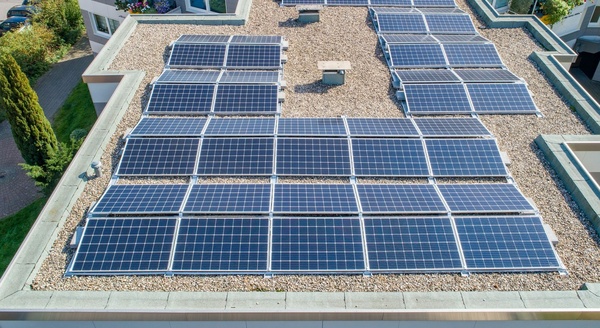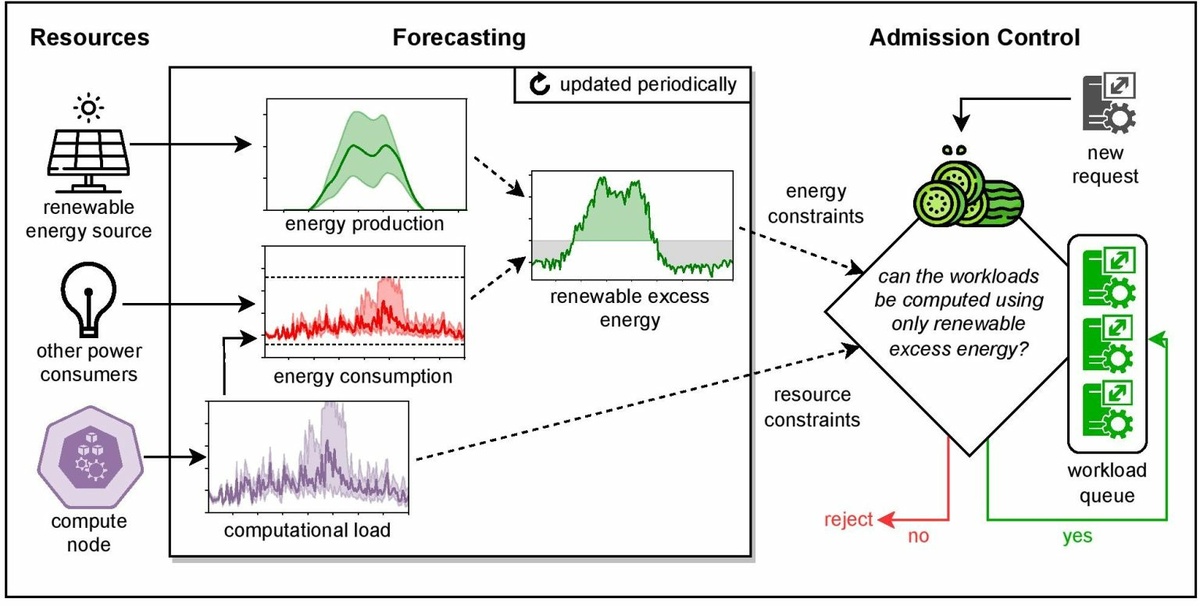Availability of green energy controls IT

The growing electricity demand of IT infrastructure will soon have a considerable impact on the environment. To reduce their carbon footprint, more and more computing systems are therefore connected to microgrids to gain direct access to renewable energy sources. However, the local availability of solar and wind energy is highly variable and requires consumers to timely adapt their consumption to the current supply. Researchers from the Berlin Institute for the Foundation of Learning and Data (BIFOLD) have developed a new admission control approach that accepts flexible workloads such as machine learning training jobs only if they can be computed relying solely on renewable excess energy. Their publication “Cucumber: Renewable-Aware Admission Control for Delay-Tolerant Cloud and Edge Workloads” will be presented at Euro-Par 2022.
As the demand for computing continues to grow year by year, so are operating expenses and the associated carbon emissions caused by consuming energy from the public power grid. “Data centers already account for more than 1% of global energy consumption and this number is expected to rise further – especially when considering the additional demand of emerging domains like the internet of things, edge and fog computing”, says Prof. Dr. Odej Kao. One approach towards more sustainable and cost-effective cloud and edge computing systems is directly equipping IT infrastructure with on-site renewable energy sources like solar or wind. However, especially smaller compute nodes, such as on-premise installations or edge data centers, are not always able to consume all generated power at all times, resulting in so-called excess energy. This problem can only partially be mitigated by energy storage or leveling consumption within microgrids.

To make better use of renewable excess energy at compute nodes, hence reducing associated carbon emissions and electricity costs, researchers of the TU Berlin and University of Glasgow proposed a new approach to schedule flexible workloads, meaning workloads that tolerate some delay in execution. Flexible workloads are common in cloud environments but can also occur in otherwise time-critical edge computing environments. For example, in many edge intelligence scenarios like traffic management, devices adapt to continuously evolving environments by iteratively re-training local machine learning models on new data. Yet, the exact time and extent of such training jobs is subject to some flexibility.
In their publication, Philipp Wiesner, Thorsten Wittkopp and the BIFOLD researchers Dominik Scheinert, Dr. Lauritz Thamsen and Prof. Dr. Odej Kao suggest that under certain conditions flexible workloads should be upfront rejected by a computing system if they cannot be computed using renewable excess energy only. Their proposed system forecasts the free computational capacity of a node as well as the expected energy consumption and production, to determine if additional jobs can be accepted to a node’s workload queue without violating any deadlines and without consuming energy from the public grid. Using probabilistic forecasting, the admission control can be configured towards being strict and only accepting workloads that are almost guaranteed to run on green energy, or towards being more relaxed and not completely ruling out potential grid power usage, if this allows more workloads to be processed.
“Increased deployment of renewables requires flexibility of electricity consumers, which is not always easy to coordinate in highly distributed and heterogeneous systems,” explains Philipp Wiesner, “We expect our approach to be an integral building block in exploiting the varying availability of renewable energy in computing through local decision-making.”
The publication in detail:
Philipp Wiesner, Dominik Scheinert, Thorsten Wittkopp, Lauritz Thamsen, Odej Kao: Proceedings of the 28th International European Conference on Parallel and Distributed Computing (Euro-Par): „Cucumber: Renewable-Aware Admission Control for Delay-Tolerant Cloud and Edge Workloads”
The growing electricity demand of cloud and edge computing increases operational costs and will soon have a considerable impact on the environment. A possible countermeasure is equipping IT infrastructure directly with on-site renewable energy sources. Yet, particularly smaller data centers may not be able to use all generated power directly at all times, while feeding it into the public grid or energy storage is often not an option. To maximize the usage of renewable excess energy, we propose Cucumber, an admission control policy that accepts delay tolerant workloads only if they can be computed within their deadlines without the use of grid energy. Using probabilistic forecasting of computational load, energy consumption, and energy production, Cucumber can be configured towards more optimistic or conservative admission.
We evaluate our approach on two scenarios using real solar production forecasts for Berlin, Mexico City, and Cape Town in a simulation environment. For scenarios where excess energy was actually available, our results show that Cucumber’s default configuration achieves acceptance rates close to the optimal case and causes 97.0 % of accepted workloads to be powered using excess energy, while more conservative admission results in 18.5 % reduced acceptance at almost zero grid power usage.
The growing electricity demand of cloud and edge computing increases operational costs and will soon have a considerable impact on the environment. A possible countermeasure is equipping IT infrastructure directly with on-site renewable energy sources. Yet, particularly smaller data centers may not be able to use all generated power directly at all times, while feeding it into the public grid or energy storage is often not an option. To maximize the usage of renewable excess energy, we propose Cucumber, an admission control policy that accepts delay tolerant workloads only if they can be computed within their deadlines without the use of grid energy. Using probabilistic forecasting of computational load, energy consumption, and energy production, Cucumber can be configured towards more optimistic or conservative admission.
We evaluate our approach on two scenarios using real solar production forecasts for Berlin, Mexico City, and Cape Town in a simulation environment. For scenarios where excess energy was actually available, our results show that Cucumber’s default configuration achieves acceptance rates close to the optimal case and causes 97.0 % of accepted workloads to be powered using excess energy, while more conservative admission results in 18.5 % reduced acceptance at almost zero grid power usage.


